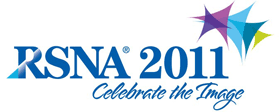
Abstract Archives of the RSNA, 2011
LL-NRS-MO7A
Aberrant Brain Activation in the Core Control Network for Cognitive Function in MS
Scientific Informal (Poster) Presentations
Presented on November 28, 2011
Presented as part of LL-NRS-MO: Neuroradiology
Maria Engström PhD, Presenter: Nothing to Disclose
Gullvi Flensner PhD, Abstract Co-Author: Nothing to Disclose
Anna-Christina Ek PhD, Abstract Co-Author: Nothing to Disclose
Anne-Marie Landtblom, Abstract Co-Author: Nothing to Disclose
Thomas Karlsson PhD, Abstract Co-Author: Nothing to Disclose
The purpose of this study was to investigate if patients with multiple sclerosis (MS) and fatigue have aberrant brain activation in the anterior insular cortex (AIC) and the anterior cingulate cortex (ACC), which are regions in the brain that are suggested to be a core network for cognitive control (Cole and Schneider, 2007; Sridharan et al., 2008).
Twelve patients with MS and eleven healthy controls were examined with functional Magnetic Resonance Imaging (fMRI) while performing a complex working memory task. The task was to indicate if words presented in video goggles had appeared in previously presented sentences. Axial blood oxygen level dependent (BOLD) images were analyzed with SPM8 software. Images were realigned for movement correction, normalised to standard brain template, and smoothed with 8mm Gaussian kernel. We used a parametric contrast that tapped brain activation as a function of difficulty level of the task, i.e. words presented after 1, 2, 3, or 4 consecutive sentences.
Healthy controls elicited more activation in the left superior parietal lobe (p<0.001 family wise error (FWE) corrected for multiple comparisons), the right caudate head (p=0.002), and ACC (p=0.004) compared to MS patients. The MS patients had more activity in the left and right inferior parietal lobe (p=0.001 and p=0.029, respectively). In addition, in a region of interest analysis the MS patients had more activation in the left dorsal and ventral AIC (p=0.011 and p=0.009, respectively). The figure shows brain activation at working memory across both healthy controls and MS.
MS patients elicited, as predicted, aberrant activation in the AIC-ACC network in that they had activation depletion in ACC and increased activity in the left AIC. It has recently been proposed that the AIC engenders awareness and the ACC engenders volitional action (Craig, 2009). The abnormal activation in this region could therefore explain the frequent symptoms of fatigue and cognitive impairment in MS.
Cognitive impairment occurs in 40-70% of individuals with MS and the patophysiology is unknown. Increased knowledge might contribute to novel strategies for symptomatic treatment.
Engström, M,
Flensner, G,
Ek, A,
Landtblom, A,
Karlsson, T,
Aberrant Brain Activation in the Core Control Network for Cognitive Function in MS. Radiological Society of North America 2011 Scientific Assembly and Annual Meeting, November 26 - December 2, 2011 ,Chicago IL.
http://archive.rsna.org/2011/11034587.html

